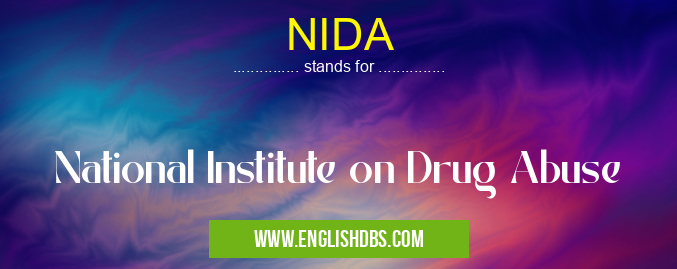What does NIDA mean in INSTITUTES
NIDA stands for the National Institute on Drug Abuse, which is an organization of the United States federal government. NIDA's mission is to lead the nation in bringing the power of science to bear on drug abuse and addiction. With their research-based knowledge, they seek to reduce drug abuse and addiction, improve public health, and benefit society in general. The institute also focuses on increasing public awareness about the dangers associated with drug use and misuse, educating Americans about how to identify and respond effectively to substance abuse and addiction problems, and informing policy makers about new advances in diagnostics, treatment strategies, prevention programs, and harm reduction initiatives.

NIDA meaning in Institutes in Governmental
NIDA mostly used in an acronym Institutes in Category Governmental that means National Institute on Drug Abuse
Shorthand: NIDA,
Full Form: National Institute on Drug Abuse
For more information of "National Institute on Drug Abuse", see the section below.
Definition of NIDA
NIDA is a branch of US government responsible for promoting scientific research into drug abuse and addiction phenomena. It is part of the National Institutes of Health (NIH) under the Department of Health and Human Services (HHS). NIDA works with researchers from around the world to develop evidence-based approaches that can be used by individuals as well as policy makers when making decisions related to preventing or treating substance use disorders. One of its goals is to bridge gaps between research findings and practice through initiatives like its Drug Abuse Treatment Outcome Studies (DATOS).
Purpose of NIDA
The purpose of NIDA is threefold: firstly, they strive to advance scientific understanding on how drugs affect brain structures; secondly, they aim to develop treatments for various substance use disorders; lastly, they are dedicated to supporting prevention strategies that decrease risk associated with substance use or misuse. NIDA works with partners across multiple sectors including clinicians, researchers, healthcare system providers, educators/faculty members at universities/colleges and policymakers at all levels of government. Through their collaborations they strive for a balanced approach involving education about substance use/misuse along with appropriate treatment interventions that adhere to evidence-based standards.
Essential Questions and Answers on National Institute on Drug Abuse in "GOVERNMENTAL»INSTITUTES"
What is the primary mission of NIDA?
The primary mission of NIDA is to advance science on the causes and consequences of drug use and addiction and to apply that knowledge to improve individual and public health.
What types of research does NIDA fund?
NIDA supports a range of research, from basic neuroscience to applied public health research. This includes studies on drug abuse interventions, treatment approaches, policy issues, prevention strategies, genetics, epidemiology, behavioral research, services research and more.
How does NIDA support early career researchers?
NIDA provides funding specifically for early career researchers through several distinct programs such as the Early Career Investigator Awards Program (ECIAP), the Mentored Clinical Scientist Development Program (MCSDP), and other opportunities.
How can individuals get involved in NIDA-related research?
Individuals can participate in clinical trials related to drug abuse at universities throughout the country. Additionally one can volunteer for surveys or observational studies at some universities or contact their local university for additional information about involvement in research studies related to drug use and/or addiction.
Does NIDA have resources for clinicians?
Yes! Clinicians can utilize a variety of resources designed specifically for them including clinical practice guidelines, webinars, teleconferences, scientific articles and publications. All these resources are available online at www.drugabuse.gov/clinicians-professional-resources
What kind of educational materials does NIDA provide?
The National Institute on Drug Abuse provides a wide range of free educational materials about drugs and substance abuse such as fact sheets, infographics, interactive activities and multimedia resources. These materials are available online at www.drugabuse.gov/sites/default/files/pages/publicationslisting_0.pdf
Where can I find information about professional training events offered by NIDA?
Information about training events offered by NIDA can be found online at www.drugabuse.gov/products-services/training-events. Here one will find an up-to-date list of upcoming training events sponsored by the National Institute on Drug Abuse which are held both in person and virtually throughout the year.
What grants does NIDA offer for scientists?
NIDA offers a variety of grant opportunities specifically geared towards scientists including fellowships in basic science addiction medicine with specific emphases on topics such as neurobiology, immunology, genetics & epigenetics etc.
Does Nida publish scientific Journals?
Yes! Nida publishes two scientific Journal - Drug & Alcohol Dependence & Experimental And Clinical Psychopharmacology - which are both dedicated to publishing original findings related to advancing knowledge about drug use disorders.
Are there any medical services programs funded by the National Institute on Drug Abuse (NIDA)?
Yes! The National Institute on Drug Abuse funds medical services programs such as those focused on providing care for individuals suffering from substance dependence through medication assisted treatments (MATs) like Methadone Maintenance Therapy (MMT).
Final Words:
In conclusion, NIDA is a governmental agency devoted to providing a comprehensive view on substance overlook abuse by researching potential causes as well as developing preventive measures against them. Their efforts span from improved public understanding about drug issues through developing targeted treatments through partnerships among medical professionals from different disciplines such as pharmacology or epidemiology. Ultimately their work seeks reduce rates of addiction while improving public health outcomes in general.
